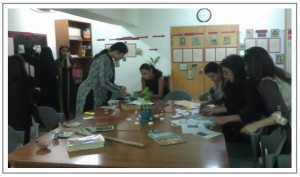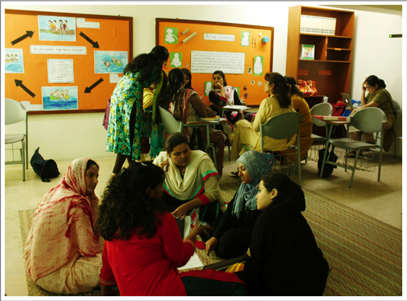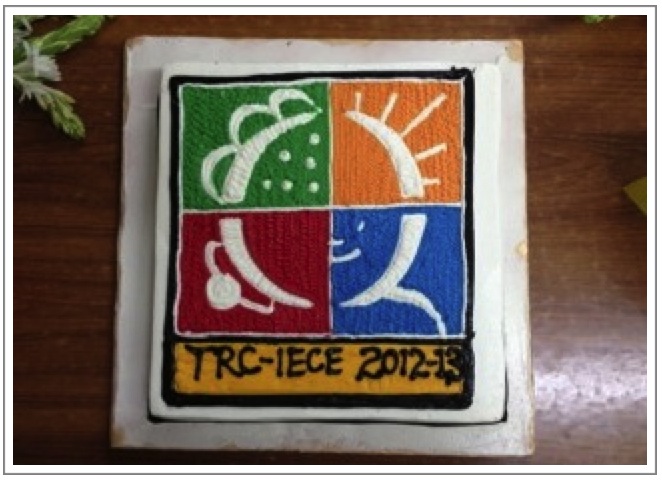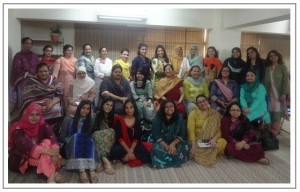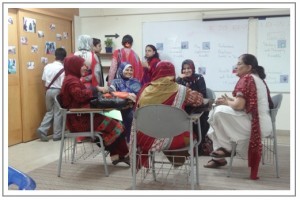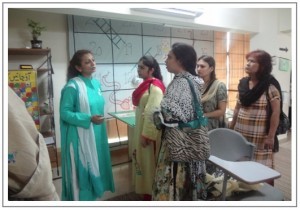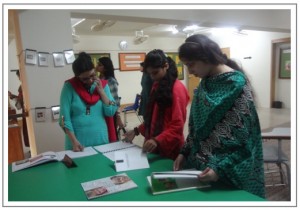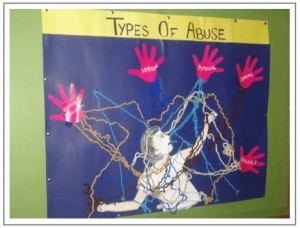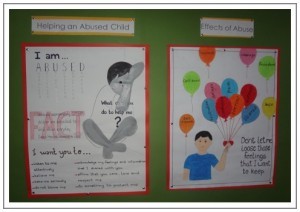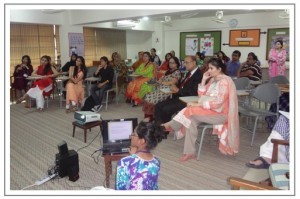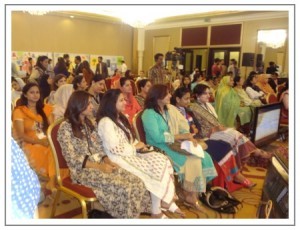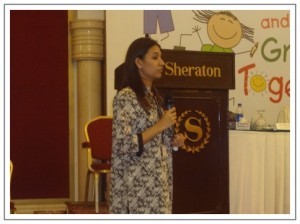TRC & CTC to Work on Paths to School Success Project in Jamshoro
From April 2013, TRC will commence the ‘Paths to School Success’ project, using the ‘Child to Child Approach’ in collaboration with the Child-to-Child Trust (CTC), London, with financial support from the DFID-Global Poverty Action Fund (GPAF).
Paths to School Success will work with eight school communities in Jamshoro, Sindh. The project will aim for higher enrolment, retention and learning achievement using the CTC approach towards learning, pedagogy and community involvement.
TRC is responsible for overall project implementation including teacher training and community involvement, following technical support from CTC for training of Master Trainers and the development of the Project Toolkit. The American Institutes for Research will carry out a longitudinal research study with baseline and final assessments of the entire project and its sustainability.
Professional Development at Bangalore Town School
On request from the Bangalore Town School, TRC conducted a 50-hour Active Learning workshop at their 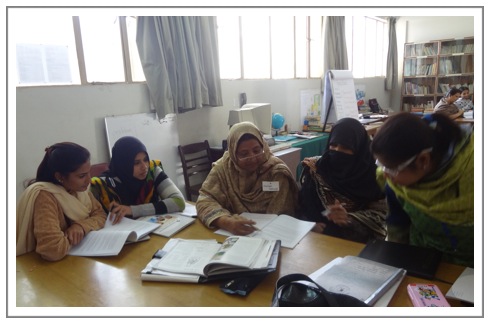 premises during January and February 2013.
premises during January and February 2013.
TRC Workshop leaders, Uzma Rauf and Tabinda Jabeen conducted the workshop, which catered to sixteen teachers, fifteen from the primary and one from the secondary section.
The wide-ranging workshop was used to introduce teachers to the National Curriculum for Early Childhood Education (2007), theories of child development and developmentally appropriate practices.
The teachers were supported in setting up the environment for active learning and were guided on rethinking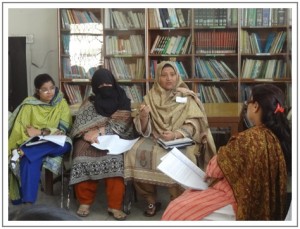 their role as a teacher in a child-centred learning environment. It was exciting to see the teachers actively engaging in discussions, exchanging views and raising questions about the ideas and concepts that were relatively new to them.
their role as a teacher in a child-centred learning environment. It was exciting to see the teachers actively engaging in discussions, exchanging views and raising questions about the ideas and concepts that were relatively new to them.
Towards the end of the session, it was heart-warming to hear the teachers sharing the changes that they had made in their classrooms and the satisfying results that they had achieved, which spurred them on to want to make bigger and more lasting changes in their classrooms and school. One teacher, Khadija, who is a subject teacher for several classes, said that the training sessions made her think about her attitudes and her behaviour with her own children too. She said that she felt the workshop had changed the way she interacts with children forever.
Launching Ceremony of ASER Pakistan – 2012
The Annual Status of Education Report (ASER) Pakistan – 2012 was launched in Sindh on January 31, 2013 in Karachi. The launching ceremony of the fourth report was organised by the Sindh Education Foundation (SEF) in collaboration with Idara-e-Taleem-o-Aagahi (ITA) and the South Asia Forum for Education Development.
In her opening remarks, Professor Anita Ghulam Ali, Managing Director, SEF hoped that the report would have an impact on government and other stakeholders enabling them to take action and attain milestones of quality education. Baela Raza Jamil, Director Programmes, ITA shared the highlights and findings of the survey.
The chief guest, Dr Fazlullah Pechuho, Secretary Education & Literacy, Government of Sindh, highlighted governance issues. Following his speech, Aziz Kabani, Director SEF chaired a panel discussion on assessing the current situation. The panellists put forward their suggestions in which they emphasised the role of the government and the need for civil society to get involved.
Annual Sports Day at Fatimiyah Girls’ School
TRC was invited by the Fatimiyah Girls’ School to attend their Annual Sports Day 2013 and prize distribution ceremony on Tuesday 29 January 2013. The event was held at the Pakistan Sports Board Centre in Karachi. Seema Yasmin represented TRC on the occasion. Taekwondo black-belter and legal advisor of the Sindh Taekwondo Association, Tabinda Paracha, was the chief guest.
Contribution to Shape New Pakistan Education Policy Document
TRC contributed to the Pakistan Country Report for the ‘Shape Pakistan Education Policy’ initiative. The UN and the World Bank through a Civil Society Consultative Process are jointly preparing the report. The Children’s Global Network Pakistan took responsibility for soliciting stakeholders’ views through a questionnaire. If you are interested in the questions, write to us and we will forward them to you.
Completing the questionnaire required TRC staff to conduct some background research on the National Education Policy and several other survey reports on the status of education in Sindh. The information and TRC staff’s personal views on improving the education system was compiled and emailed by February 14, 2013.
Policy Dialogue on Career Counselling for Youth
On February 13, 2013 the Youth Affairs Department, Government of Sindh organised an event on careers for youth in Karachi. Seema Yasmin represented TRC at the event, which was a policy-level dialogue on the significance of career counselling.
Career Counselling for Youth is a collaborative project of the Youth Affairs Department and the organisation, Capacity Builder. The venture facilitates and supports youth in choosing career options and is aimed at students in graduate institutes, intermediate colleges and schools.
The event began with Mansoor Vindhani, Director, Capacity Builder, who highlighted the history and achievements of the project. The panel discussion focused on a variety of ideas for career counselling in educational institutes. Provincial Minister for Youth Affairs, Faisal Sabzwari was the chief guest at the event; he talked about improving the standard of education all over Pakistan and about the need to guide the youth of our country.
BVS High School Organises 152nd Annual Secondary Sports Day
On February 23, 2013, the senior section of BVS School held its Sports Day at the Karachi Parsi Institute in Karachi. Nighat Hasan represented TRC at what was the school’s 152nd Annual Secondary Sports Day. Dr Bernadette L. Dean, the principal St. Joseph’s College for Women was the chief guest at the event.
BVS’ high school students participated enthusiastically in the various contests, which included several traditional Sports Day games such as tyre rolling, hurdle race, band race and tug-of-war. Parents were also invited to the event.
Celebrating the Passage of Sindh Provincial Bill (Article 25-A)
On February 27, 2013 the Education and Literacy Department, Government of Sindh and UNESCO organised an event in Karachi to celebrate the historic passage of the Sindh Provincial Bill on the Right to Free and Compulsory Education Act 2013, and the Road Map to the Future. Tabinda Jabeen represented TRC at the event, which was attended by parliamentarians, educationists and government officials, UNESCO and UNICEF representatives and civil society. As the Act stands unanimously passed by the Sindh Assembly, the focus now is on its implementation in letter and spirit, which needs to be underlined and actively advocated. The objectives of arranging the seminar were to bring together stakeholders for creating momentum towards the implementation of the Act.
The event began with welcome remarks by UNESCO representative, Dr Kozue Kay Nagata. She congratulated the Government of Sindh on passing the bill, adding that it is the government’s responsibility to implement the law. She also emphasised that UNESCO will support the Education Department in monitoring its implementation. In his speech, Dr Fazlullah Pehchoho, Secretary Education Sindh, said that the Government of Sindh would commence work on the bill by recruiting 25,000 teachers and by setting up school monitoring committees. He added that school budgets would be allocated in line with this bill.
The guest speakers congratulated the government and noted that the bill is very comprehensive and its goals should be to face the challenges such as expanding access, improving retention and governance and providing quality education. They suggested analysing past laws to understand why they had failed. Speakers also recommended starting a campaign to raise awareness and create public demand for quality education. The chief guest, Senior Minister for Education, Pir Mazhar-ul-Haq acknowledged the contribution of educationists and UNESCO and praised their commitment and effort in drafting the bill.
Evaluation at Shahwilayat Public School
In response to a request received from the trustees of Shahwilayat Public School, Rubina Naqvi from TRC commenced an evaluation programme at the school in February 2013. The areas determined for evaluation by the management were: classroom management, discipline and marking of students’ work.
A total of 26 teachers from Classes 1 to 3 are being observed, as identified by the school management. Marking of students’ written work is also being reviewed in their notebooks.
The programme is presently underway, and will conclude in May 2013. Visits are being made to the school to observe teaching practice in the classroom. At the end of the programme, a report with findings and recommendations will be submitted to the management.
Professional Development Programme at The Intellect School
The trustees of The Intellect School also requested TRC for a programme to promote the professional development of their teachers. The programme commenced in February with an evaluation and will conclude in April 2013. Currently, Rubina Naqvi is carrying out a series of classroom observations with a focus on: lesson planning, classroom management, teaching methodology and assessment.
A total of 25 teachers who teach Nursery to Class VII have been identified for the programme. Each teacher will be observed twice, followed by a feedback session. The observations and individual feedback will be followed by a workshop that will highlight the good practices observed and will explore areas for school and teacher improvement. A report will be submitted at the end of the programme, highlighting the findings and recommendations.
External Evaluation of the Catholic Education Board Schools
TRC was recently approached to co-conduct an external evaluation of the Programme Office Education of the Catholic Education Board, on behalf kasino ja aly Niin paljon kun ihmiset puhuvat pahaa kasinoista ja riippuvuudesta, se ei aina ole totta. of Misereor Germany. Amima Sayeed represented TRC as local consultant along with an international consultant, Dr Heinrich Heinrichs from Germany. All six dioceses, Rawalpindi, Lahore, Faisalabad, Hyderabad, Karachi and Multan were visited while discussions with office bearers of the Quetta dioceses were carried out in Karachi owing to security issues. The purpose of the evaluation was to gauge the impact of Misereor financial support extended to the Programme Office Education for infrastructure development, in-service training and provision of computer and science lab equipment to Catholic Schools across Pakistan. Starting in February, the evaluation concluded in March with the submission of a report highlighting key recommendations and new directions for strengthening the Catholic Board Education System.
Annual Comparative and International Education Society Conference
TRC contributed to a panel presentation on “Crafting an ECD Goal in the post 2015 development agenda – making a case for sustained gains for access, quality and citizenship – Lessons from Asia” at the 57th Annual Comparative and International Education Society (CIES) Conference, held in New Orleans, Louisiana from March 10-15, 2013. The panel included Baela Raza Jamil from ITA and ASER, Junko Miyahara from ARNEC and Amima Sayeed from TRC.
The Education Support Programme of the Open Society Foundation, facilitated participation in the conference. Unfortunately, Amima Sayeed could not travel because of visa hitches, but Fatima Zahra made the TRC presentation on her behalf. The panels’ findings and recommendations were well received by the audience.
It is being discussed that a National level dialogue should be organized once the newly elected government is in place, to push for ECCE policy implementation in the post-18th Amendment scenario.
Sindh Basic Education Programme MIS Dissemination Conference
On March 27, 2013, TRC was invited to the dissemination conference of the Sindh Basic Education Programme Management Information System (MIS), a programme run through USAID funding to the Government of Sindh for school consolidation and support. Amima Sayeed represented TRC.
The purpose of the dissemination event was to share how iMMAP has completed a comprehensive mapping exercise of all schools in the following districts of northern Sindh: Jacobabad; Sukkur, Khairpur, Qambar-Shadad Kot, Kashmore, Dadu, Larkana and the following towns in Karachi: Gadap, Lyari, Orangi, Kemari, and Bin Qasim.
In addition to mapping, a Graphical User Interface (GUI) portal has been developed that is accessible to multiple users for various applications. This portal allows access to geo-databases with information on all schools in these districts/towns. The portal has been developed in consultation with RSU/SEMIS staff and can be viewed at the following link:
http://sbep.gos.pk
On the basis of this mapping exercise, USAID is making recommendations to the GoS Programme Steering Committee for school consolidation, upgrading and merging of campuses in accordance with the GoS policy on school consolidation for the seven districts and five towns.
At the event, Naveed Sheikh of the Reform Support Unit and Dr Randy Hatfield of USAID, explained that the need for school consolidation is critical to ensure better governance and effective use of public finance for running a quality public education system. At present, there are over 50, 000 schools in Sindh and a majority of these are two-room schools in a dilapidated condition. Undertaking this exercise will cut down operational expenses significantly; resulting in bigger and better managed schools. Dr Hatfield shared that IMMAP’s initiative started as a baseline in order to figure out which schools to consolidate. However, it has transformed itself into a full-fledged information portal openly accessible to policy makers and practitioners for informed reforms and decisions.
Mr Parvaiz Sehar, Special Secretary Education also spoke at the occasion highlighting the commitment of the Government of Sindh to undertake education programmes, which had been well thought out for the improvement of the public education system. He also invited comments and feedback on the School Consolidation Policy, as there is room for improving the implementation process.
The Indus Academy Adopts Active Learning
Following a series of meetings to discuss professional development and school improvement, The Indus Academy requested TRC to help them train their ECE teachers from pre-school to Class 1.
A 50-hour workshop on Active Learning, conducted by Uzma Rauf, commenced at the school premises on March 25, 2013. A total of 22 teachers, nine from Grade I and 13 from the preschool are attending the workshop, which will end in April. In May, the workshop will be repeated with another group of teachers.
The workshop, which has been tailored to meet the school’s needs, will focus on child development, brain development, theories related to children’s learning and development, DAP (developmentally appropriate practices) and principles and beliefs of quality ECE programmes, that are highlighted in the National Curriculum for Early Childhood Education 2007.
This participative, hands-on workshop, which consists of brainstorming, interactive lectures, assigned readings, role-play, pair and group activities, is the first step in empowering the Indus Academy teachers to implement the Active Learning philosophy in their classrooms.
TRC Conducts PARCO Workshop in Faisalabad
On March 27-28, 2013, TRC conducted a nine-hour workshop, titled ‘How Children Learn’ for the teachers of public sector schools supported by PARCO’s CSR Programme in Faisalabad.
Nighat Hasan and Tabinda Jabeen facilitated a diverse group of 28 female teachers working with different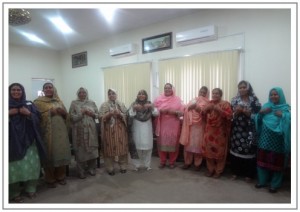 age groups of children and adults. This turned out to be quite a challenge, since our brief was, training for primary school teachers. When teachers from the Government Polytechnic College and teachers of graduate students also turned up, some quick problem solving and revising of the workshop plan had to be done; once teachers arrive at the workshop venue, it is best to include them and make them feel welcome.
age groups of children and adults. This turned out to be quite a challenge, since our brief was, training for primary school teachers. When teachers from the Government Polytechnic College and teachers of graduate students also turned up, some quick problem solving and revising of the workshop plan had to be done; once teachers arrive at the workshop venue, it is best to include them and make them feel welcome.
The workshop focussed on Child Development, the Learning Environment and the Teacher’s Role and Responsibilities. Given participants’ needs, the child development milestones and introduction to effective learning environment principles were extended to include older students too. According to the participants, the workshop was well organised and they got an opportunity to share their views and ideas. Different 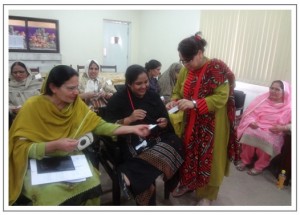 strategies such as group discussion think-pair- share, brainstorming and presentations were used, which can be replicated in their classrooms too. Some of the participants commented that the duration of the workshop was very short, and they did not have enough discussion on children’s behaviour. They requested a workshop on character building and more teaching strategies for adult learners.
strategies such as group discussion think-pair- share, brainstorming and presentations were used, which can be replicated in their classrooms too. Some of the participants commented that the duration of the workshop was very short, and they did not have enough discussion on children’s behaviour. They requested a workshop on character building and more teaching strategies for adult learners.
This was the third in a series of four workshops requested by PARCO. The first workshop was conducted at the TRC premises in Karachi and the second was conducted in Mehmood Kot, Muzaffargarh. (Please see News Bulletin October – December 2012 for details). Following this workshop in Faisalabad, the fourth workshop will be conducted in Shikarpur in April 2013.


